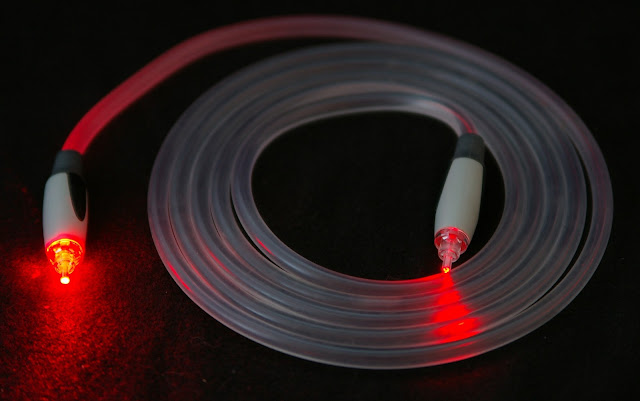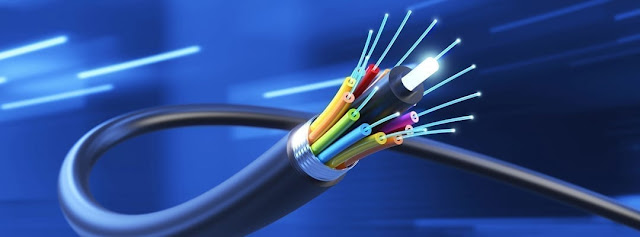What is Fiber Optic Cable?
The world of telecommunications is rapidly moving from copper wire networks to fiber optics. Optical fiber is a very thin strand of
pure glass that acts as a waveguide for light over long distances. It uses a
principle known as total internal reflection. Fiber optic cable is actually made up of two layers of glass: the
core, which carries the signal light itself, and the sheath, which is a layer
of a glass surrounding the core. The sheath has a lower refractive index than the
core. This causes total internal reflection in the core.
Most fibers operate in duplex pairs: one fiber is used to
transmit and the other to receive. But it is possible to send both signals on a
single strand.
There are two main types of fiber optic cables: single-mode
fiber (SMF) and multimode fiber (MMF). The main difference lies in the size of
the core. MMF has a much larger core, allowing multiple modes (or
"rays") of light to propagate. SMF has a very narrow core which
allows only one mode of light to propagate. Each type of fiber has different
properties with its own advantages and disadvantages.
Browse offers and find the wholesale price of fiber optic cables, rs232 communication cables, and much more. The many types of communication cables each have a specific
composition, design, and function. An underwater communication cable, for
example, is a cable that crosses the seabed. It consists of a gigantic 8-layer,
one-inch-thick cable that serves to connect continents and other territories
across a large expanse of water. Most modern ones have fiber optic cables in their core. This allows for transcontinental
signal communication. Cutting it down, we have another type of cable, the USB
communication cable. This is common in computer peripherals and
accessories, such as mice, keyboards, webcams, etc.
Another important aspect of the price composition of fiber optic cables and wires is whether
they are shielded or unshielded. An unshielded communication wire does not have
a metallic layer that surrounds the internal wirings. Unshielded twisted pair
(UTP) communication wire is an example of this type of wire. This shielding is
important to protect the transmission from interference. It also acts as a
grounding element, allowing faster transmissions. Shielded twisted pair (STP)
communication cable is an example of a shielded cable. Other important network
cables include the Modbus communication
cable and Profibus communication
cable. Both are used in complex network data transfers. They work with
other connectors under a master/slave protocol.
On Litech.com.pk, you can get in touch with international
suppliers. Find fiber optic cable price,
Modbus cabling components, serial communication
cable, and much more. Browse the offers, check the specifications and choose
a supplier with the right communication
cables and wires for your commercial stock.
Why use optic fiber cable?
- They have practically unlimited information
- They have a high load capacity (very wide bandwidth, THz or Tbits/s)
- They have very low transmission losses (<0.2dB/km, microwave cf1dB/km, twisted copper pair 10db/km)
- They do not dissipate heat
- They are immune to crosstalk and electromagnetic interference
Medical
Fiber optics is
suitable for medical use. They can be made into extremely thin, flexible strands
for insertion into the lungs, blood vessels, and many hollow parts of the body.
These optical fibers are used in
several instruments that allow doctors to observe the internal parts of the
body without performing surgery.
Telecommunications
Optical fiber is
installed and used for reception and transmission purposes. Telephone
transmission uses fiber optic cables.
These fibers transmit energy in the form of light pulses. Its technology is
comparable to that of coaxial cables,
except that optical fibers are
capable of handling thousands of conversations simultaneously.
Networking
Fiber optics is
used to connect servers and users in a variety of network settings and also
helps increase the accuracy and speed of data transmission.
Industrial/Commercial
Fibers are used for imaging in range areas, such as sensory
devices to make temperatures, such as wiring where EMI is a concern, pressure,
such as wiring in industrial environments and automobiles. Broadcast/CATV cable
companies use fiber optic cables for
cabling HDTV, CATV, video-on-demand, Internet, and many other applications.
Defense/Government
They are used as hydrophones for SONAR and seismic
applications, such as wiring in submarines, aircraft, and other vehicles.
Data storage
Fiber optic cables
are used for data storage as well as transmission. Fiber optic cables are also used for imaging and lighting and as
sensors to monitor and measure a wide range of variables. Additionally, fiber optic cables are used in the development, research, and testing in all of the aforementioned applications.




0 Comments